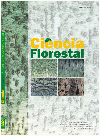
|
Ciência Florestal
Centro de Pesquisas Florestais - CEPEF, Departamento de Ciências Florestais - DCFL, Programa de Pós Graduação em Engenharia Florestal - PPGEF
ISSN: 0103-9954
EISSN: 0103-9954
Vol. 24, No. 3, 2014, pp. 749-757
|
 Bioline Code: cf14072
Bioline Code: cf14072
Full paper language: Portuguese
Document type: Note
Document available free of charge
|
|
|
Ciência Florestal, Vol. 24, No. 3, 2014, pp. 749-757
| pt |
IMPACTOS DO NOVO CÓDIGO FLORESTAL NA REGULARIZAÇÃO AMBIENTAL DE PROPRIEDADES RURAIS FAMILIARES
Feistauer, Diogo; Lovato, Paulo Emilio; Siminski, Alexandre & Resende, Sidivan Aparecido
Resumo
Os efeitos do novo Código Florestal Brasileiro (CFB) - Lei Federal 12.651/2012 - foram avaliados em
relação à adequação de unidades familiares de produção conduzidas em sistema de produção orgânico
(SPO) ou convencional (SPC). Foram estudadas 17 propriedades rurais do território Portal da Amazônia,
quantificando-se as áreas totais, de preservação permanente (APP) e de reserva legal (RL), usando-se o
Sistema de Informação Geográfica (SIG). Compararam-se os resultados com o que é exigido para o bioma
Amazônia pelo novo CFB. A maior parte das propriedades avaliadas não apresentou o mínimo exigido para
as áreas de RL e APP (nascentes e margem de córregos). As propriedades em SPO apresentaram melhores
resultados em relação àquelas conduzidas em SPC quanto à manutenção da vegetação nativa nas APPs,
além de um maior percentual de remanescentes florestais compondo a RL das propriedades. Tendo em vista
consolidação das áreas desmatadas anteriormente a 22/07/2008, previstas no novo CFB, todas as dezessete
propriedades sanaram seus passivos ambientais do ponto de vista da legislação brasileira atual para RL. No
caso das APPs, todas as nove propriedades em SPO sanaram seus passivos ambientais, enquanto que no
SPC isso ocorreu em quatro das sete avaliadas.
Palavras-chave
adequação ambiental; Código Florestal Brasileiro; Amazônia
|
| |
| en |
IMPACT OF THE NEW BRAZILIAN FORESTRY CODE ON THE ADEQUACY OF SMALL FARM HOUSEHOLDS TO THE ENVIRONMENTAL LAW
Feistauer, Diogo; Lovato, Paulo Emilio; Siminski, Alexandre & Resende, Sidivan Aparecido
Abstract
In order to evaluate the effects of Brazil’s new Forest Code on the legal status of farm households, 17 farms,
located in Portal da Amazonia territory, northern Mato Grosso state, and managed in either conventional
specialized farm (CPS) or organic (OPS) production systems were studied. The total area per farm, as well
as the surfaces of legal reserve units and preservation areas were measured by using Geographic Information
System (GIS), to allow a comparison of these data with legal requirements for the Amazon Region. Most of
the small farm households did not comply with the required percentages of land for Legal Reserve (LR) and
Permanent Preservation Areas (PPA), in the latter case regarding riparian areas and areas for protection of
water sources. Farms under OPS showed better results regarding preservation of native vegetation as well
as higher percentages of forest remnants in their LR. Considering the amnesties and exemptions established
by the New Forest Code, most farms have complied with the terms and requirements of current Brazilian
environmental regulations.
Keywords
environmental adequacy; Brazilian Forest Code; Amazon region
|
| |
© Copyright 2014 - Ciência Florestal
Alternative site location: http://cascavel.ufsm.br/revistas/ojs-2.2.2/index.php/cienciaflorestal/index
|
|
